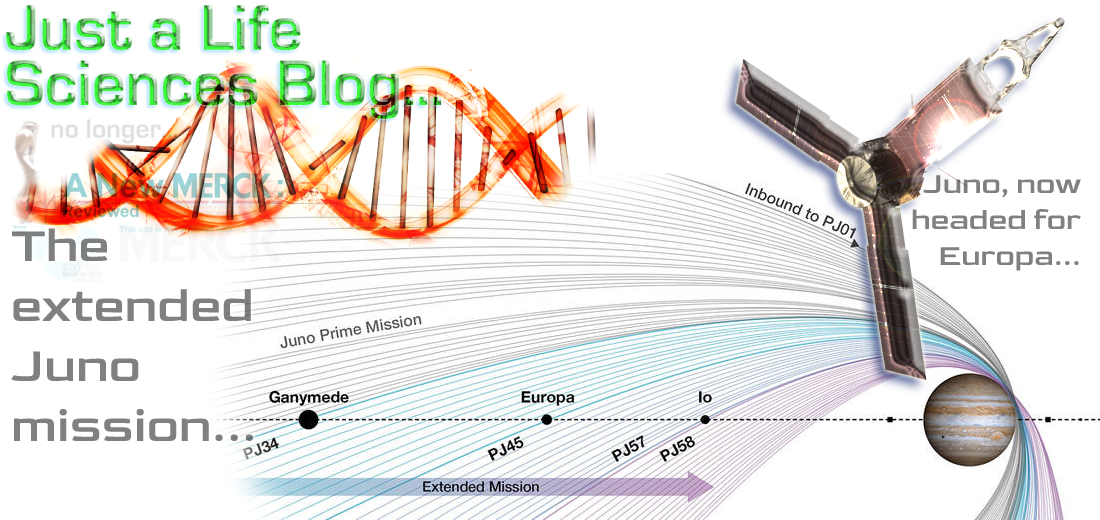 It was six years ago, tonight, that I mentioned Europa flybys (and Hubble imagery) in detail. Time to. . . see, and learn more:
It was six years ago, tonight, that I mentioned Europa flybys (and Hubble imagery) in detail. Time to. . . see, and learn more:
The lithely graceful, long legged copper-hued Juno -- periodically dipping in close to Jupiter, ever since July of 2016, will now extend its mission, and float weightlessly very close to three of the massive, whirring giant's captive, and shepherded moons. So I am. . . thrilled, in a word. This is the sort of space science where we get a huge additional return on our investment, for nearly no new additional cap ex -- as we only need spend for ground support teams and the dish time to stay in communication, as we adjust the smooth sailing beauty's orbital paths, into 2025.
As you may imagine (if you're a longer term reader), I am grinning widely -- expectantly awaiting what we learn, about Europa, especially. Here is the latest, from Ars Technica:
. . .As part of a research plan submitted by Scott Bolton, Juno's principal investigator. . . [she will whiz] within 320km of Europa in late 2022 and to within 1,500km of the volcanically active Io twice in 2024. . . .
With these flybys, Juno will be able to study surface changes on Ganymede since the Voyager and Galileo missions and investigate the 3-D structure of Ganymede's magnetosphere. In coming so close to Europa, Juno should be able to identify regions where the moon's ice shell is thick or thin and confirm the presence of subsurface liquid water. In making multiple close flybys of Io, Juno will monitor short-term changes in volcanic activity, which evolved dramatically between Voyager and Galileo over a matter of months. . . .

Join me, please -- in applauding the idea that even in a time of tests, for our system of ordered liberty, the best and brightest of us can keep their eyes fixed on these admittedly distant prizes, and the interplanetary / interstellar insights we may glean, glistening in the clear cold night skies. . . way. . . out there. We all sleep, afterall, under these same night skies. Onward.

नमस्ते

















4 comments:
meanwhile on 'other worldly news':https://phys.org/news/2022-09-nasa-gears-deflect-asteroid-key.html
Popcorn and a six pack of root beer to watch
Hey, Anon. -- as to DART, absolutely. . . the 26th can't come soon enough!!!
Will be grinning -- ear to ear, as we await the movies of that smash up!
Namaste. . . .
meanwhile, closer to home: https://www.washingtonpost.com/climate-environment/2022/09/22/ocean-drone-hurricane-fiona-waves/. impressive...would not want to be out in that...
Me either. . . and the tech that lets us see this stuff in real time, from a "safer" distance. . . is just jaw-slacking.
Yeah, I'd rather fight an avalanche any day, than be at sea in a Cat. 3 or 4 hurricane.
But. . . I don't plan on doing either, ever again(!). . . .
Next up? DART post for Monday. . . namaste.
Post a Comment